Board and Committee Reports
These do not require a vote. These items have been placed on the Consent Calendar.
Overview of Discipleship Ministries
Leadership Development Board
New Faith Expressions Board
Action and Advocacy Board
Wellness and Missions Board
Young People’s Ministry
Committee on Hispanic/Latino Ministries
Committee on Native American Ministries
Board of Trustees
Communications
Discipleship Council
Board of Ordained Ministry
General/Jurisdictional Conference Delegation
BWC Delegation Report & Statement
Discipleship Ministries
Overview of Discipleship Ministries
The Baltimore-Washington Conference seeks to inspire and equip faith communities to develop disciples of Jesus Christ for the transformation of the world so that more transformed lives transform lives. We continue to journey together through COVID-19, civil unrest and denominational uncertainty -- knowing that the God who delivered the oppressed from captivity will surely deliver us. And that we will rise united through Jesus Christ, who rose so that all may be free. Because of that, we are still one: standing, transforming, rising.
Staffing for this Season
Just as churches are discerning the best staffing models to strengthen their witness and optimize their resources, we as the BWC Mission Center staff are doing the same. We understand the imperative to equip and fortify disciples who witness to Jesus Christ through acts of compassion, justice, devotion and worship under the guidance of the Holy Spirit. We understand the need to be and foster evangelistic, non-anxious, inclusive, equitable, innovative, and connected ministry. We are committed to being discipling leaders who work well together, do no harm, do good and obey the ordinances of God. We also recognize the need for continued adaptability and agility in these unprecedented times.
Under the leadership of Bishop LaTrelle Miller Easterling, strategic organizational changes have been underway in preparation for the affiliation between the Peninsula-Delaware and Baltimore-Washington conferences. This affiliation will officially be in effect on September 1, 2021, and will continue at least until December 31, 2022. The goal is to use this shift as an opportunity to maximize our effectiveness, increase collaboration, and enhance our mission.
To best serve the needs of our churches and to lean into the possibilities of shared ministry with Pen-Del, we are focusing on critical programs, building teams, and removing organizational barriers to allow the gifts and graces of leaders to flourish and for critical initiatives to be adequately resourced.
We are prioritizing initiatives that support 100 percent of our faith communities becoming 100 percent vital. These initiatives include: The Catalyst Initiative, The Missional Action Plan[1], We Rise United to build Beloved Community, Training Tuesdays and The Center for Leadership Vitality. These include our five Foci: Leader Development, New Faith Expressions, Young People’s Ministry, Advocacy & Action and Wellness & Mission, and the objectives of the Next Level Leadership Academy.
As we adopt a stronger focus on projects and initiatives, titles will become less and less specific. We also believe this approach models well what we hope for in our churches: collaborative, nimble, mission-focused leaders who equip the saints for relevant ministry. Gone are the days of specialists with specific, siloed portfolios.
To facilitate this, we welcome the new roles of Chief Administrative Officer, Rev. Erica Robinson-Johnson and Chief Program Officer/BWC Director of Connectional Ministries (DCM), Christie Latona.
As Latona takes on responsibilities of the Chief Program Officer, Kayla Spears will be moving from Business Data Administrator to serve as the Programs Coordinator. Kayla has worked at the Conference Mission Center in a variety of roles for 11 years. She brings to the position human-centered design-thinking, project management, technical expertise, and problem-solving skills. She will be responsible for providing coordination for major programs, including the Catalyst Initiative.
The following five leaders will work with our BWC Discipleship Agencies to co-lead our missional effort to inspire and equip congregations to develop disciples of Jesus Christ for the transformation of the world so that more transformed lives transform lives:
- Rev. Bill Brown, Director of Innovative Evangelism, will continue to focus on new faith expressions, Training Tuesdays, Catalyst Initiative, Unified Funding Task Force and congregational assessment and consultation networks.
- Rev. Neal Christie, Executive Minister of Connected Engagement, will be providing collaborative leadership for Young People’s engagement; campus ministry; forums; multiethnic and cross-racial/cross-cultural ministry, conflict transformation, community organizing, and legislative advocacy teams. His experience in conflict transformation and building relationships across the denomination, between the church and society and between young people and the church are timely for this season of ministry.
- Cheryl Cook will be moving from Coordinator of Young People’s Ministry and Special Projects into the role of Discipleship Ministries Manager. This new role will enable Cheryl to use her deep knowledge of our ministries, excellent relational, marketing and customer service skills to serve as the primary point of contact for leaders seeking resourcing. She will continue to coordinate the following Young People’s Ministry areas: innovation, training team and youth rally/retreat (formerly known as ROCK).
- While continuing to serve as the Executive Director of Pecometh, Rev. Jack Shitama will bring a focus on vital, non-anxious leadership as he leads the Center for Vital Leadership that will strategically serve leaders--lay, clergy and young people--in both the BWC and Pen-Del. His leadership will also resource the BWC Board of Ordained Ministry’s clergy care team, culture of call team, and RIM team; BWC’s Leadership Development Board and coaching network. This three-year contract with Pecometh will provide time to develop a robust leadership development process and flexibility to pivot as needed.
- Rev. Stacey Cole Wilson, Executive Minister of Beloved Community, will continue to focus on building Beloved Community through the work of relevant ministry teams, community partnerships and equipping churches to be grounded in Gospel-informed inclusion, diversity, equity and antiracism.
Thea Becton (Wellness & Missions Coordinator), Emma Escobar (Hispanic/Latino Ministries Coordinator), Lauren Harris (Congregational Vitality Coordinator), Jodi Iyamu (Justice Projects Coordinator) and Retreat and Camping Ministries (RCM) staff will continue to provide leadership and excellent equipping within their current ministry areas while collaborating on specific projects as needed.
Please join us in welcoming to the team:
Rev. Bonnie McCubbin, Director of Museums and Pilgrimage, who brings her deep calling and passion around bringing United Methodist history to life to refocus us on learning from our history.
Sabrina Tarver, Archive Administrator and Librarian, who supports the work of the Director of Museums and Pilgrimage while keeping our Archives in order and accessible for research and learning.
Hilary Ann Golden, Ministerial Services Administrator, serves to ensure our Board of Ordained Ministries, DCOMs and candidates are supported in their work.
Rev. Leo Yates, Accessibility and Inclusivity Coordinator, who will work with the Commission on Disability to support congregations becoming more accessible and inclusive while strengthening our Deaf Ministries.
Through creative staffing, project-based planning and outsourcing we are organizing for more impact with the same staffing dollars; these changes are budget neutral.
This new collaborative, mission-driven approach will enable the conference to better equip and inspire local churches as they live out the justice, love and hope of God in our congregations and communities. Furthermore, we are thankful for and celebrate the ministry of Erik Alsgaard (Senior Pastor of Community Church in Crofton, MD), Sharonda Jones (founder of Little Phoenixes Foundation), John Nupp (Senior Pastor of Chevy Chase UMC in Chevy Chase, MD), Rodney Smothers (Senior Pastor of Grace United Methodist Church in Fort Washington, MD) and Joyce White (Retired). These skilled servant workers have poured themselves out for the sake of the gospel and for God’s glory.
Glimmers of Hope
We celebrate all our churches, new faith expressions, retreat and camping, campus ministries, ROCK and other ministries for still standing, transforming and rising. As you read through the reports that follow this overview, join us in praising God and thanking leaders for their resilience, courage and faith that is getting us through these challenging times.
Standing
At the 2019 Session of Annual Conference, a streamlined realignment plan for Discipleship agencies was passed. Two years later -- in the midst of multiple pandemics -- our hopes for increased collaboration, improved communication, and more feet on the ground are being realized in many areas.
- In 2019, the Native American Ministry Team consisted of one person and now there are five out of seven active members, who know their purpose and who have been equipping local congregations to engage this ministry.
- In 2019, the Commission on Disability hadn’t met and now, they are meeting, reviewing local church accessibility audits and getting ready to welcome a new staff member who will collaborate with them to make goals of accessibility and inclusion a reality.
- In 2019, our legislative action was staff-driven and now there is an active and ever-growing team of persons who are engaging both locally, regionally and nationally in collaboration with each of the eight Advocacy & Action teams to determine specific, measurable, legislative actions for 2021-2022 consistent with our Social Principles and Resolutions
- In 2019, the YPM Training Team was an idea on paper and now a team of seven have planned and delivered at least four trainings a year for a total of about 400 youth leaders per year.
- In 2019, the Wellness & Mission Board’s Abundant Health team was talking about potential training and approaches to resource wellness ministries at the local church. In the fall of 2020 they launched a comprehensive Abundant Health Plan, have conducted multiple webinars on COVID, mental health and trauma.
The pandemic hit our YPM Board the hardest as young people in school didn’t need any additional Zoom meetings and Campus, RCM and ROCK had to do major pivots in their ministry areas. If you or a young person you know are interested in helping to lead and shape Young People’s Ministry, please contact the Rev. Neal Christie ( ).
We celebrate and solicit prayers for the ongoing work of ministry board recruitment and improvement. We thank God and the many skilled servant leaders who enable us to proclaim that we are still standing.
Transforming
In September of 2020, BWC’s Catalyst Initiative was selected for a $1 million dollar grant from the Lilly Endowment, Inc’s Thriving Congregations Initiative. The aim of the national initiative is to strengthen Christian congregations so they can help people deepen their relationships with God, build strong relationships with each other, and contribute to the flourishing of local communities and the world.
We celebrate the fact that even in the midst of dual pandemics we had 18 congregations bold enough to invest in transformation and complete an extensive application. Here are the stats:
- 67 BWC churches submitted an intent to apply form,
- A total of 25 churches took the Readiness 360 as a part of the application process and have a faithful next step,
- 18 churches in six of the eight districts completed the application and 14 were ready
- Catalyst Initiative Class of 2021 includes 12 churches from six districts and all four regions.
The Orientation Retreat was held virtually in May with approximately 75 participants and this pilot will conclude in March of 2021. At least four more rounds are funded and we look forward to seeing the transformation that results for more than 100 BWC congregations.
Rising
As was reported at the 2020 Annual Conference Session, under the leadership of Bishop LaTrelle Miller Easterling, our Discipleship Council, and our Executive Minister of Beloved Community, our approach to ending racism and growing cultural humility was accelerated and expanded. From July 1, 2020-July 1, 2021, we have:
- Trained all conference staff (including DSs) in inclusion, diversity, equity and antiracism practices and are conducting monthly check-ins to support that practice with Dushaw Hockett of the SPACES Project.
- Incorporated the ICC/Beloved Community Covenant into staff expectations.
- Began testing a six-unit curriculum to support leaders -- staff, lay, clergy, church -- in making the creating Beloved Community Covenant and identifying their next faithful steps.
- Partnered with The People’s Supper to train table hosts and conduct the first Mapping a Pathway to Racial Justice series of 5 conversations. We are working with interested parties to replicate these transformational conversations in their local contexts.
- Introduced the importance and some principles of building the beloved community at each transition workshop for congregations receiving a new pastor.
- In partnership with Rev. Dr. HiRho Park, we developed a curriculum, A Diverse Church by Design, for Cross Racial/Cross Cultural appointments and churches who need to better connect with their communities.
- Conducted 284 IDI debriefs with personalized Intercultural Development Plans to help persons develop a strategy for taking their next faithful developmental step towards cultural humility.
- Published 25 news and feature stories, nine viewpoint pieces, and 149 articles, conversations and encouragements about Beloved Community and making inclusive, diverse, equitable antiracist choices.
- Developed collaborative workgroups to support leaders and congregations who need support with: getting started, getting churches on board, and/or legislative action.
We know this is a journey of a lifetime and that each choice we make -- each action we take or don’t take -- either makes us an agent of God’s liberating love or not.
Please take the time to read each ministry report. May they bring you glimmers of hope that undergird the reality that we are still one -- standing, transforming, and rising.
Submitted by:
Bill Brown, Director of Innovative Evangelism
Christie Latona, Chief Program Officer/DCM
Kayla Spears, Program Coordinator
Stacey Cole Wilson, Executive Minister of Beloved Community
[1] The Missional Action Plan is focused on leveraging our presence and property for the good of the wider community.
Leadership Development Board
The Leadership Development Board was established to equip and mature leaders and nurture a culture through which call, competency and spiritual maturity work together to develop and equip vibrant lay and clergy leadership through the Baltimore-Washington Conference. The Leadership Development Board coordinates, supports and contributes to the crafting of all leadership efforts within the Conference.
Our goals for this year were to continue Training Tuesdays, which has been well attended and successful in the past. We also offered a fall training event titled, “Next Level Leadership Academy,” to provide a more intensive training environment for local church leaders. Two of these programs were successfully held. The Board, in partnership with Call and Clergy Care, planned to offer group training for clergy and CLMs in Orientation to Ministry as well as a clear and substantive information for clergy about CLM training.
The impact made through Training Tuesdays and the Next Level Leadership Academy programs provided clergy and laity in local churches with the tools and resources to equip them through relevant, timely and innovative training to become disciples who make disciples of Jesus Christ for the transformation, not only in their local churches, but for their communities and for the world.
On Sept. 1, we welcomed the Rev. Jack Shitama from the Peninsula-Delaware Conference, and in consultation with him, we will be working with members from Pen-Del in order to expand the coordination and support of leadership efforts to our affiliation partners.
Pastor Nona Colbert
Chair, Leadership Development Board
Conference Board of Laity
The purpose of the Conference Board of Laity is to foster an awareness of the role of the laity locally and in the world in achieving the mission of the church to make disciples. The BWC membership includes the conference lay leader; director of Lay Speaking Ministries, Scouting coordinator, presidents of the United Methodist Men and United Methodist Women, and representatives from the young adult and youth ministries councils. In the BWC, we freely share information concerning the lay ministry throughout the United Methodist denomination.
This past year has been a time of great challenge and uncertainty. The entire world has been dealing with the COVID-19 virus and we have been in a “stay-at-home” mode. Meetings have been canceled or creatively accomplished in other ways. We have learned new technology and ways to stay connected. Most of our traditional training has been halted, but sharing the message of Jesus Christ has never stopped.
The Board of Laity continued to be accountable to the Annual Conference and is a voice for the non-clergy members in the church. The Board informs pastors and provides them with resources and means for equipping the laity to witness to the community and the world. With the pandemic, this is a time in the life of the church that we pray we will never witness again.
Regular meetings were held with the district lay leaders and the director of Certified Lay Minister/Lay Servant Ministry. At one of these meetings, it was suggested that we have a retreat, hopefully sometime in 2022. We are excited about the new possibilities of working with the laity in the Peninsula-Delaware Conference, as part of the new affiliation between our two conferences.
The speakers to give the Lay Leader address during this Annual Conference’s plenary session were chosen from our CLM group. They are Delilah and Gregory Parham, members of Queens Chapel UMC in Beltsville, Md. The speaker for the Laity Session is David Teel, Director of Lay Services, Discipleship Ministries in Nashville, Tenn.
During the year, because of the pandemic, the Northeastern Jurisdiction Conference Lay Leaders have participated in monthly meetings. It has been a time of sharing information from each conference and getting ideas of how we can better connect with our fellow laity. It is very rewarding.
We look forward to another productive Annual Conference year in the Baltimore-Washington Conference.
Delores Martin, Conference Lay Leader
Certified Lay Ministry Program
The purpose of the Certified Lay Ministry Program is to promote and provide consistent training, program development and ministry opportunities for laity who are called to serve as Certified Lay Ministers in the Baltimore-Washington Conference.
The 2020 program goals were to 1) continue initial training programs for CLM applicants in the process during the pandemic; 2) develop procedures to enable the use of the online CLM course modules offered by beadisciple.com to meet Conference training requirements; and 3) to create opportunities for CLMs to serve together beyond the local church.
All our goals were met. Two cohorts were able to complete their CLM training via virtual class meetings led by conference clergy. A comparative study of the conference’s CLM training modules and the Be a Disciple virtual course informed the development of the guide, which outlines how to use the Be a Disciple virtual offerings while meeting Conference requirements. The guide was developed and put into use with at least two CLM applicants. A group of CLMs from all districts worked together to design and produce a virtual Christmas Eve worship service for churches to use in Advent of 2020. The work of these goals increased the capacity of our CLMs to use their gifts to provide congregational leadership to local churches as they make disciples in and outside the church.
In 2021, our program goals include working with Fresh Expressions to offer a CLM specialization track in Lay Church Planting, providing preaching assistance for Laity Sunday services where needed, and planning a retreat for the more than 120 CLMs in the Conference to network, study, and grow in their ministry.
Minister Linda Flanagan
Conference Director of Lay Servant Ministries
New Faith Expressions Board
The New Faith Expressions Board equips and encourages change-makers to gather new people in new places and spaces in order to bring the Church Jesus loves closer to the people Jesus loves.
2020 was a year like no other, and we believe the word of the year should be “pivot.” Due to the COVID 19 pandemic, churches had to pivot from an in-person strategy to an online strategy, and New Faith Expressions embraced and equipped local churches in this season by:
- Offering various Training Tuesday opportunities to provide the latest learnings and best practices for our new reality
- Provided two rounds of tech grants, up to $1,000, which enabled congregations to purchase the necessary equipment to launch into cyberspace.
As a Board, we also had to pivot. As we began to implement our strategy, we quickly realized our goals would be adjusted. These goals were:
- Launch four Micro-Church Trainings, one in each region.
- Restructure current grant model and add new micro-grants
- In collaboration with Hispanic-Latino Ministries develop a strategy for Hispanic-Latino church plants
- Launch Lay Planter Training, with Path 1
While we were unable to accomplish goals #1 and 3, due to the pandemic, we did restructure our grant model, which will add Micro-grants to in 2022, and we did launch Lay Planter Training in partnership with Path 1, as the first annual conference to offer lay planter training all online. Since we could not have the in-person Micro Church Training, we pivoted and offered Digital Church Planter Training and New People New Places Training, all online. As far as impact is concerned, one of the lay planter training participants, Hilda Macauley, started a new faith community within her congregation using the Upper Room. She says, “We come together and share the good news of God’s reign and God’s love for us…We created a small group where relationships of trust, love, and confidentiality are shared.”
In addition to continuing to build upon our 2020 goals, we launched 2 initiatives, a Vital Merger on the Annapolis District and the Solomons Mission Center on the Washington East District. We also set the following goals:
- Expand New People for New Places Fresh Expressions Training
- Develop an Academy for Church Planters
- Develop a process for local church revitalization
- Update our newFX Strategy document
Rev. Bill Brown, Director of Innovative Evangelism
Deborah Johnson, Chair of New Faith Expressions Board
Action and Advocacy Board
We seek to inspire and equip local faith communities to develop disciples of Jesus Christ for the transformation of the world through partnering with communities, advocating to transform systems that disenfranchise, marginalize and oppress. Through our legislative actions, we create a BWC presence on urgent policy matters at local, state, and national levels.
Inspiring and Equipping Local Faith Communities:
- Continued supporting our Conference-wide commitment of building Beloved Community via our We Rise United Initiative.
- Received a $10K Human Relations Day grant from the General Board of Global Ministries to further our public witness against racially motivated hate acts and increase acts of justice and compassion. This grant supports congregational solidarity efforts that advance antiracism toward Beloved Community.
- Received a $10K grant from the General Board of Global Ministries to support Cross-Racial and Cross-Cultural (CRCC) Ministry with Asian American Pacific Islander (AAPI) pastors and congregations and reduce racially motivated acts and biases toward AAPIs. The grant supports pastoral and congregational leader development, raising awareness among other racial and ethnic communities re: biases and other harmful acts that are targeted against AAPIs, identifying assets and contributions among AAPI congregations, amplifying resources for resistance to harm, and creating resources as needed.
Our ministry accomplishments include:
Developing Disciples of Jesus Christ:
- Joined together in Conference-wide Prayer on the first and third Wednesdays of every month, to discern God’s direction and pray for congregations, communities, families and individuals.
- Held Creation Care/Environmental Justice Webinar on Social Principles and Actions UMs can take to better care for and protect God’s creation.
- Conducted Meditative Moments with Kendrick Weaver as heart-set ministry work.
- Held Caucus Gathering to continue learning best practices and methods to grow in cultural humility.
Offering a BWC. Presence on Urgent Policy Matters:
- Legislative Action team worked with social action teams and our UMC Social Principles to engage in multiple efforts including Faith and Community Policing Legislation
- Creation Care - Mike Koob (see team report.)
- Gender Equality and Equity – Andrea Johnson and Jan Taylor, Partnering with the Board of Ordained Ministry to conduct a Gender in Ministry Study
- Immigrant Justice – Amy Caruso and Emma Escobar (see team report including Migrant Justice at the US Borders)
- Racial Justice – William Carpenter (see team report) Church consultations and formation of three workgroups: 1. How to Get Started and/or Get Greater Participation in Building Beloved Community(Jessica Hayden and William Carpenters) 2. A Mission to Develop Change Agents for Racial Justice (Valerie Barnes) and 3. Legislative and Policy for Change (Beth Reilly and Will
- Restorative Justice – Sonia King and Brian Jackson (see team report)
- Co-organized COVID-19 Vaccination Clinics with Abundant Health Team
- Native American Ministries (see team report)
- Wealth Equity – Revs. Dana Jones and Rev. Rochelle Andrews
Our end of the year goals call for us to faithfully respond to God’s call for justice, mercy and advocacy by collaborating with individuals and organizations to transform unjust and oppressive systems as rooted in Scripture, The Social Principles, and the Resolutions of the UMC. They include:
- Create an educational devotion/guide for congregations seeking to practice the work of justice, mercy and advocacy.
- Continue building congregational capacity and mobilization through 1:1 congregational consultations, our social action teams and community organizing training.
- Developing a robust opt-in process for Action Alerts.
Tracy Collins, Advocacy and Action Board Chair
Stacey Cole Wilson, Executive Minister of Beloved Community
Racial Justice Team (formerly Conference Committee on Religion and Race)
The Racial Justice Team seeks to bring awareness to the problem of racism to the people of the Baltimore Washington Conference, by offering resources and support for those who seek to become educated, and who wish to educate others, on topics related to the causes and effects of racism. Further, the Racial Justice Team seeks to offer tools and strategies for racism prevention as well as elevate and support individuals and communities that have been impacted by racism and the legacy of racism in the church and world.
2020 was a transitional year for the Racial Justice Team and, as such, there were many challenges to establishing and achieving concrete goals. Beginning in the latter part of 2020, the team became more cohesive and, beginning in 2021, was able to create a more coordinated set of objectives. They included:
- Engaging local churches so that all of our BWC churches are on a path toward becoming racial justice change agents.
- Supporting and providing programs of education in areas of intercultural competency, institutional equity, and vital conversations at every level of the conference
- Supporting local churches in having needed conversations and experiences to grow in intercultural competency and antiracism in moving toward beloved community based on church conference form information.
The Racial Justice Team was able to form several key workgroups that focus on key areas of racial justice ministries. They include:
- Workgroup 1 – How to get started and/or get more participants in Anti-Racism/Building the Beloved Community.
- Workgroup 2 – Being a Servant Leader in a Divided Congregation.
- Workgroup 3 – Legislation and Policy for Change
- Workgroup 4 – Next Steps
The purpose of these groups is to provide support and guidance for congregations and individuals who seek to become more engaged in Anti-Racism work both within their congregations and in the broader community. To this end, the Racial Justice Team, in conjunction with other groups within Advocacy and Action have sponsored both two key virtual events:
- Mapping a Path to Racial Justice: A Journey Toward Beloved Community
- Equity 2.0 – a six-month accountability group of no more than 10 people per cohort designed to reduce bias and increase belonging in your life.
By the end of 2021, the goal of the Racial Justice Team is to have four active, fully engaged workgroups focused on the work of building the Beloved Community, within our congregations, the BWC, and within our communities by continuing to partner with local congregations in the work of antiracism.
Immigration Rights Team
The purpose of this committee is to educate those who are part of the conference and beyond about immigration issues and to inspire the BWC to personal and political actions that support the lives of immigrants in this country.
Goal: Our goal for 2020 was to solidify a team of folks who were really interested and invested in the work for immigration justice.
Impact: The team inspired people to love more deeply those who are undocumented in this country through three events:
- A DACA Dreamers webinar A webinar on advocacy and action with the new Biden administration and with local Maryland state government
- A webinar discussing the theological basis for hospitality Goals for later on in 2021
- Later on in the fall, the team will host Immigration 101 and invite people to enter into the experience.
Amy B. Caruso, chair of Immigration Rights Team
Restorative Justice Team
The purpose of the Restorative Justice Team is to be an agent for healing and systemic change. We are called to be the repairer of the breach, the restorer of streets to live in. (Isaiah 58:12b)
During the past year, we:
- Focused on legislation dealing with prison reform, reentry, advocacy and the like in the Legislative Session for this year.
- Worked on team/leadership development. We looked at the team and leadership. Some members asked to be removed as their duties have not allowed them to be involved. Rev. Brian Jackson and I are looking to move into an advisory role. We have spoken to a member who is in prayer about chairing. We will continue to recruit.
- Presented at UMW’s Mission U: The class, on July 23-24, 2021, was entitled “Pushout: The Criminalization of Black Girls in Schools.” The panel consisted of Rev. Tim Warner and Rev. Dr. Joseph Daniels and Rev. Dr. Sonia King
- Planned a Healing Community Training. We have two churches that are interested, but have not set a date yet due to the pandemic. This training is very interactive and would be best implemented in person.
Other ways we have served via team members:
- Kairos has been intentional in writing letters to inmates at Roxbury and Western Correctional Institute.
- Assisted with inmates finding jobs and assistance in resume writing through Justice Jobs in Frederick.
- Middletown UMC is working with Children of Incarcerated Parents
- Brooklyn Community UMC is providing produce and food for those returning from incarceration. and proving temporary hotel stays for those returning with no place else to go.
We continue to pray and support those in need. We will continue to focus on these goals.
Rev. Dr. Sonia L. King, Co-Chair
Creation Care Team
The purpose of the Creation Care Team is to mobilize and advance the care of God’s very good creation in the context of an environmental and climate emergency.
The team’s goal is to train and equip additional Global Ministries EarthKeepers and establish and support more Green Teams in more churches. We align our work with the Social Principles and Resolutions of the UMC.
Throughout work, clergy and lay people in the BWC were exhorted to take the universal Christian vocation to care for the community of all creation seriously. We presented and recorded a webinar on Environmental Justice ~ Environmental Racism through the conference. We also amplified the calls for action from our general boards and agencies. We signed petitions and called on legislators. Green Teams lead the way in projects like composting, rain gardens, and energy-saving strategies.
This year, we will advocate for the Maryland Environmental Human Rights (mdehr.org) amendment; support the formation and continued work of Green Teams; encourage more people to become EarthKeepers; collaborate with our regional partners Interfaith Power and Light and Interfaith Partners for the Chesapeake, and engage with the National UMC Creation Justice movement and the United Methodist Women.
Mike Koob, Global Ministries EarthKeeper and chair
Wellness and Missions Board
The Wellness & Missions Board fulfills its mission to equip disciples of Jesus Christ for the transformation of the world. This is accomplished through disaster response, short mission trips, mission itineracy, and abundant health areas of ministry. We praise God that while our doors may have been closed due to the pandemic our hearts remained open and minds remained open to find new ways to put our faith in action.
- Our disaster response teams did not deploy. With your help, 1,840 new UMCOR kits were collected with an estimated value of $36,679.00. VIM teams were asked not to travel so we took mission trips online. From Palestine to Georgia to Maine individuals ages 15 to 87 traveled the world through ZOOM to learn about education, health, agricultural, and youth ministry programs around the world.
- The Abundant Health team worked with partners across the state to provide training webinars on topics of trauma, grief, mental health, financial health, and other matters to help educate individuals about the faith and health connection.
- Missionaries continued to serve around the world. The Conference has 11 missionaries serving. In 2020, the people of this Conference contributed $40,660.05 to support these faithful servants.
- Quality of Life Retreats took the HIV/AIDS ministry online through two virtual retreats. This ministry reached a total of 97 participants this season. According to Ella Curry, secretary of the Quality of Life retreats, “We learned that our ministry of spiritual and informational retreats is essential to people living with HIV, not only in a pandemic, but also in the aftermath of traumas such as social isolation, lost family and friends, grief without the benefit of longstanding rituals, and the stigma/stress that attaches to yet another life-threatening viral infection.”
In these uncertain times, there are many things we do not know. One thing we can be sure of is that God is still at work in our lives. The Wellness & Missions Board, in ministry alignment with the General Board of Global Ministries, and in partnership with all of you continues to support around the globe. The people of the Baltimore-Washington Conference contributed more than $265,000 for global ministries, UMCOR, Imagine No Malaria, Abundant Health, World Hunger & Poverty and the COVID-19 Response Fund.
In the year ahead, the Wellness & Missions Board will implement a strategy to invite more people to be in service with us. This will help to ensure our efforts are relevant and informed by those seeking to put their passion into action. We will follow the direction of our Episcopal leadership and refrain from travel at this time. Virtual travel opportunities will continue to be presented for short-term mission trips, visits with missionaries in service, and those living with HIV/AIDS. Webinars, community forums, and Town Hall sessions will continue to be provided online to help equip local churches in all areas of wholeness: mind, body, and spirit.
Rev. Laurie Pierce Tingley, Wellness and Missions Board Chair
Young People’s Board
The purpose of the board is to activate, connect, and engage more young people as disciples of Jesus for the transformation of lives, churches, and communities.
In spite of the disruption caused by the covid pandemic the Young People’s Ministries engaged in these timely and relevant ministries in 2021. Among our accomplishments are:
- Quarterly youth leader trainings led by experts in the field were held via Zoom to continue to train and support youth leaders during this time of unknowns.
- ROCK was held virtually with more than 600 people registered; breakouts offered addressed training youth leaders, connecting youth and youth leaders with others across their districts, addressing racism, human rights, mental health, faith in the time of COVID, and life after high school.
- Continued partnership with the Wellness and Missions board for supporting the mental health of youth and young adults throughout the conference and providing resources to churches to help youth leaders at local churches address mental health issues, like anxiety, depression, and suicide, with their youth
- Circulated a College Registry and Young Adult Registry form to all congregations to determine which two and four colleges in Maryland, Washington, D.C., and West Virginia students will be enrolled in.
- ROCK has now become WAVE as a joint youth event for BWC and Penn-Del and it will provide opportunities for training and leader development for both youth and adults in attendance.
Our 2022 goals include:
- Offer quarterly youth leader trainings led by experts to continue to train and support youth leaders.
- Connect with 100 young adults from across each of the eight Districts through the “Let’s Talk About___” tour that will give space for young adults to ask tough questions around issues and to reflect theologically on where God is in all of it. The “Let’s Talk About _____” tour will symbolically and physically open the doors of the church to young adults across the Conference.
- Expand Campus Ministry connections in at least five locations in partnership with area congregations as appropriate.
- Provide four opportunities to focus on mental wellness and resiliency for college students and Campus Ministries in partnership with Wellness and Missions
- Design two retreat experiences for young adults focused on vocational discernment, civic engagement and spiritual practices for young adults.
- Continue partnership with the Wellness and Missions Board for supporting the mental health of youth and young adults throughout the conference and providing resources to churches to help youth leaders at local churches address mental health issues, like anxiety, depression, and suicide, with their youth
Shemaiah Strickland, Chair
Neal Christie, Executive Minister of Connected Engagement
Retreat and Camping Ministries
Retreat and Camping Ministries provide camp and retreat opportunities that utilize experiential learning and communal Christian living to guide individuals as they discover the love of God, self, neighbor, and nature.
The COVID-19 pandemic had a significant impact on Retreat and Camping Ministries. The things that make RCM such a powerful ministry, bringing people together for an intensive communal experience, were precisely the things we could not safely do in 2020.
Camp Harmison, Manidokan Camp and Retreat Center, and The West River Center closed on March 12, 2020. On May 1, 2020, the decision was made to cancel our summer camp programs.
Throughout the summer, staff and volunteers from Manidokan and West River created more than 100 videos, activities, crafts, and more to help campers continue their personal and spiritual growth even though we could not gather at camp. This was an incredible pivot that allowed us to continue our summer ministry in totally new ways.
The sites did offer COVID safe opportunities including hiking, boating, picnics, family unit rentals, ropes course, carryout meals, and educational programming as conditions allowed. The West River Center opened as a community food pantry.
Kirstin Shrom-Rhoads and Steve Lane at Manidokan raised funds for camp by hiking the entire 40.9-mile portion of the Appalachian Trail that runs through Maryland. Chris Schlieckert and Matthew Surber at West River raised funds by running a mile for each day of camp that was missed, culminating in a 14-mile run on what would have been the last day of camp.
The lack of guests on-site also provided an opportunity to take on-site improvements at Manidokan and West River. Manidokan resurfaced the pool, constructed a new hammock pavilion, and completed the new Director’s house. At West River the pool underwent a major renovation, the Retreat Center was remodeled, the Eagle’s Rest campfire ring was completed, and a portion of the boardwalk was rebuilt.
The cancelation of our summer camp programs and closure to retreat groups had a massive impact on the finances of Retreat and Camping Ministries. However, the support from The Baltimore-Washington Conference, and Council on Finance and Administration, in particular, has been incredible. Their financial support in 2020 allowed us to retain all our full-time staff, continue to maintain and improve our facilities, explore new ways of being in ministry, and prepare for the safe resumption of our operations. I am unaware of any other camps that have received the level of support we have in the Baltimore-Washington Conference. We are truly grateful.
Despite the disruption from COVID-19 we still made progress on many of our 2020 goals:
- Launch new fundraising opportunities: The Taste of West River was a big success right before we shut down for COVID-19. The I-Kan obstacle race at Manidokan was postponed.
- Revise and standardize the health protocols at the camps: This work was completed and implemented for summer camp 2021.
- Continue to live into our long-range plan: An aquatics and hospitality coordinator was hired at West River and a new hammock pavilion was constructed at Manidokan.
- Transition to a new registration system for summer camps and retreats: The CampWise system was implemented and is currently being used.
- Complete a $1.2 million living shoreline project at West River to redo 1,000 feet of shoreline: This project was delayed and not completed in 2020, but was completed in spring of 2021.
- Construct a new director’s house at Manidokan: This project saw delays but has been completed.
We kept people safe in the midst of the pandemic and continued to be in ministry to the best of our ability while positioning RCM for a successful resumption of camp and retreat ministries.
This year our goals are goals include:
- Safely resume to summer camp programming.
- Safely resume retreat group hosting.
- Implement mental health support program for summer camp.
It is a privilege to work with the dedicated and caring staff and volunteers of our retreat and camping ministries who work tirelessly to help campers and guests grow in the love of God, self, neighbor, and nature.
Chris Schlieckert
Director of Retreat & Camping Ministries
American University United Methodist Campus Ministry
The mission of campus ministry at American University in Washington, D.C., is engaging with students in discipleship and the values of the UMC as well as providing spiritual care to the university community.
During the 2020-21 school year at American University, our goal was to continue to provide opportunities for discipleship and community under the restrictions of COVID. Ministry continued with virtual worship, Bible study, and social opportunities. Each week we averaged eight students engaging in the weekly pre-recorded worship. In Bible study, we had four students regularly participating. Throughout the school year, we engaged with 34 students, caring for the pastoral and social needs of students separated by distance and through computer screens. For the 2021-22 school year we are re-launching ministry on campus with a focus on rebuilding community and connection as well as engaging the campus and the world beyond it through our mission to Love God, Serve Others, and Welcome All.
Rev. Joey Heath-Mason
American University
Associate Chaplain for United Methodist Life
University of Maryland Campus Ministry
The 2020-2021 school year was certainly a wild ride. We kicked off last fall with the motto "The Terp Hub isn't canceled." In that vein, we began the school year with weekly worship on Instagram Live. During the week we gathered for small groups using the curriculum Animate: Bible by Nadia Boltz Weber. We ended the fall semester with a worship night on Zoom and invited all those that support us; the Cluster Church Pastors, the Board, and other BWC employees and fans of the ministry. Then, in the Spring semester, we combined the ingredients of worship and small group into a virtual Dinner Church service where we sang songs, read Scripture, and dialogued over the curriculum The Racial Healing Handbook.
With the new 2021-2022 school year upon us, we plan to focus on growing our ministry by investing in building relationships through weekly one-on-ones with new students, gathering weekly for encouragement and discernment via a small group, and worshipping and sharing dinner together every two weeks.
Cristin Cooper, Hub Coordinator, University of Maryland
Wesley Foundation at Howard University
The Wesley Foundation at Howard University is a space committed to bringing relevant meaning to the Gospel of Jesus Christ to young adults. We desire to put into praxis our theological tasks as disciples to grow in spiritual maturity. We believe that all students are welcome to participate in God's generous love and grace. We are an innovative organization that has inspired many traditions that continue at Howard University today, i.e. alternative spring break. We are known for our mission trips, Bible studies, nature retreats, justice internships, and spaces that affirm Christ's love to students coming from all walks of life. Our ministry is unique and timely as it connects Howard's mission to lead with truth and service, to faith and purpose.
Rev. Alexis F. Brown
Campus Minister for The Wesley Foundation at Howard University
Frostburg State University United Campus Ministry
United Campus Ministry at Frostburg State University was one of only two ministry organizations active on campus during the pandemic. We were able to meet in a hybrid arrangement through Zoom and face-to-face with social distancing. Three of our small groups maintained our weekly Bible studies in this fashion and we conducted chapel service completely online each Sunday.
We remained mission-minded even though we were not able to do some of our normal service events. However, we were able to perform 68 hours of community service which included: a hunger project, we provided care packages to our students who were quarantined for testing positive for Covid or who got sick after being vaccinated; we also created four flood buckets and numerous hygiene kits for UMCOR.
Continuing our Healing of the Racial Divide social justice programs, we created a listening post partnering this year with the Frostburg Congregational Church. UCM student leaders and Chaplain Cindy had a major role in the dedication ceremony of FSU’s memorial to the Brownsville Community. Brownsville was a self-sustaining community started by two former slaves. The community and John Wesley African Methodist Church were displaced as the university grew. United Campus Ministry started in the John Wesley Methodist Church in the early ’60s and, was thus, recognized for its continued presence on FSU’s campus and a legacy to the Brownsville Community.
It was a very difficult, heart-breaking year in that we lost three students to non-covid deaths, two of which were on our student leadership team. We conducted memorial services for these with over 2,000 students in attendance.
Cindy Zirlott
Chaplain, United Campus Ministry
Committee on Hispanic-Latino Ministries
The purpose of this committee is to “support the development, implementation, and evaluation of a Hispanic-Latino comprehensive plan of action and the strategies for working with Hispanic-Latino persons of all generations in the community.” (Book of Discipline ¶655)
The committee’s work has had a significant impact in a number of areas, including:
- Advocacy: In coordination with the Baltimore-Washington Conference, we are working with the BWC Immigration Task Force in everything they are organizing.
- Faithful Discipleship: We continue with our leadership school focus on racism in the church. We had a Zoom webinar on June 12, 2021, with Rev. Dr. Eliezer Valentín Castañón on “Inmigración y Racismo” (Immigration and Racism).
- Connectional Commitment: Supporting Hispanic Youth Leadership Academy (HYLA) at Wesley Theological Seminary.
During the pandemic, we have used a monthly newsletter with the Spanish-speaking community, "El Pueblo,” in which we promote educational and advocacy projects to equip Hispanic-Latino disciples in the BWC. The objective is to communicate and keep us connected.
We celebrated worship services on Three Kings Day, Easter, and Pentecost by Facebook live stream.
Due to the pandemic, the immersion trip that we offer each year was canceled for 2021. We hope to be able to offer it in 2022.
We are serving seven Hispanic-Latino ministries at Brook Hill, UMC, Nueva Vida Mission at College Park UMC, Epworth, UMC, Salem UMC, Hughes-El Buen Samaritano UMC, Liberty Grove UMC, Vida Nueva en Cristo at Calvary UMC.
We celebrate the appointment of Pastor Casandra Nunez to Salem ministry; she is supported in this ministry by her husband, Cesar Nunez. We welcome her to the Baltimore-Washington Conference. We also celebrate the election of Rev. Dr. Giovanni Arroyo as General Secretary of the General Commission on Religion and Race.
Our goals for 2021 are to identify, equip, and engage leaders to build relationships and do justice with Hispanic-Latinos in their communities, so that more first and second generation Hispanic-Latinos can love God and neighbor.
We are working to offer workshops from September 2021 to February 2022 (6 in total) on “Identificando las raices del racismo en la iglesia” (Identifying the Roots of Racism in the Church). The course helps participants to understand the phenomenon of racism, not only in the world but also in the church.
We are preparing celebrations for Hispanic Heritage Month and Christmas. We hope to offer them in a hybrid way, both in person and online.
Normally, we have a three-day family camp, but this year we will only gathered for one day of fellowship time on Saturday, Aug. 28, 2021. We are trusting that in 2022 we will do it as we usually do.
Rev. Dr. Miguel Balderas; Committee Chair
Marcela Uberhuaga; Committee Vice-chair
Committee on Native American Ministry (CONAM)
Overall Goals of CONAM:
- Support Native American ministry and outreach.
- Promote awareness of the history and current realities of Native communities.
- Advocate for the physical, mental, and spiritual health of all Native Americans.
- Advocate for the rights of all Native Americans.
- Help develop and support Native leadership within their own communities.
CONAM’s Goals for This Year:
- Begin to rebuild an active Committee on Native American Ministry (CoNAM) in the BWC.
- Provide opportunities for members of the BWC to build awareness of issues impacting Native American communities.
- Build relationships with CONAMs throughout the Northeast Jurisdiction so we can learn from them.
CONAM’s Actions This Year:
- CONAM meets monthly to pray and plan together.
- We encouraged churches to recognize Native American Ministries Sunday by providing information and worship materials.
- We coordinated and hosted a webinar to build awareness of Missing and Murdered Indigenous Women and Girls. Our speakers were from two different Native communities. The speakers also provided information on the devastating impact of COVID-19 in their communities.
- We supported a Native American International Caucus proclamation condemning Senator Rick Santorum for racist statements that intentionally ignored more than 6,000 years of Native American history prior to European colonization.
- We supported a Call to Action by the NAIC asking that the Church commit to addressing the history of Methodist boarding schools and calling on an observance on Oct. 6, 2021, as a day of Truth and Repentance for children who died, committed suicide or went missing at these schools.
- We will advocate for wearing orange on Oct. 6, 2021, which is the official color in Canada and the U.S. to recognize children lost to boarding schools.
- On Sept. 23, 2021, we will facilitate a viewing and discussion of “Journey to Forgiveness.” In this documentary, women and men bravely share their own experiences of abuse at Indian Boarding Schools as well as the lasting effect the violence has had on their lives and the lives of their family members. There are also interviews during which tribal elders discuss intergenerational trauma and the path toward healing through forgiveness.
Humbly Submitted by
Richard Church and Jill Maisch, CONAM Co-Chairs
Stewardship Ministries
Board of Trustees
The Board of Trustees holds in trust for the benefit of the Annual Conference any real or personal property, bequests, and donations conveyed to the Annual Conference, and acts to safeguard the rights and interests of the Annual Conference.
The Board of Trustees is composed of clergy and lay people from each region who volunteer their time, spirit and experience to this service, along with Ex Officio members who are staff of the Baltimore-Washington Conference including the CFO, controller, facilities manager, Cabinet representative, and bishop. As chair of this committee, I am grateful that every member of this board is engaged, active and attentive, and possessing of insight, critical thought and Christian love. I thank each of them, and I thank our Lord for calling them to service.
The Trustees administer several funds in support of their work. Apportioned funds include the Trustees Fund (which pays property insurance, utilities, maintenance, and capital expenses) and the Conference Center Fund (which pays mortgage, service contracts, computer and telecommunications, supplies, and other related costs). The Trustees Fund finished 2020 about 10 percent over budget due to reduced Mission Share income during the COVID year and increased maintenance and capital expense. The Conference Center Fund likewise finished the year over budget also due to reduced Mission Share income and increased mortgage expense. The Board of Trustees also administers non-apportioned funds; the Parsonage Reserves and Mission Center Reserves for the long-term care and replacement of those properties. The District Funds receive monies from the sale of closed church properties. Such funds are designated by Discipline for use in the urban areas or non-urban areas in which the properties are located. Lastly, the Trustees administer funds for grants and loans (through the Unified Funding Taskforce). At the end of 2020, the Trustees had thirty outstanding loans to local congregations dating back to 2012 with balances totaling just under 1.5 million dollars.
The COVID-19 pandemic impacted every aspect of Conference activity through most of 2020. The Trustees continued to meet monthly and at other times through online conferencing. Along with other conference boards and agencies, the Trustees looked for ways to ease the burden on local churches. Congregations with outstanding loans had payments and interest accumulation waived for three months. Additional forbearance has been extended in the first part of 2021. Many congregations utilized the Payroll Protection Program to receive payroll loans, including some congregations which closed in 2020 or early 2021. The Trustees worked with the former members to ensure that any PPP loans had previously been forgiven or received forgiveness as part of the closure process.
Following the specially called General Conference of 2019, the Baltimore-Washington Board of Trustees was charged by the newly created ¶ 2553 of the Book of Discipline (2016) with developing additional standard terms supplemental to the minimum terms of the GCF&A template for local congregations of this Annual Conference wishing to disaffiliate from The United Methodist Church due to specific actions of the General Conference related to human sexuality “or the actions or inactions of its annual conference related to these issues which follow.” The Board of Trustees has made good progress in this work, balancing the duty to the Annual Conference and the rights of the local congregations, in consultation as mandated with the Cabinet, the Chancellor, the Commission on Finance and Administration, and Connectional Ministries. As of this year’s Annual Conference, the Protocol of Reconciliation & Grace through Separation, which includes ¶ 2553 has drawn broad support moving into the delayed General Conference scheduled for 2022.
In other financial stewardship since the last Annual Conference; the Trustees have been tracking bequests from the three different estates made to closed churches which passed in trust to the Baltimore-Washington Conference. Since the last Annual Conference, the Trustees have also worked to find a tenant for the commercial space in the Conference Center previously occupied by the African Art Museum. By policy, this space is designated for a non-profit organization. After reviewing several possible tenants, the Center for Watershed Protection was identified as an appropriate and sustainable tenant. A ten-year lease was negotiated and improvements were made to the space to provide dedicated restrooms and to divided the rental space from the Mission Center space for security and privacy.
This year saw the completion of the new director’s residence at Camp Manidokan after a mold problem made the previous building not suitable as a residence. Extensive remediation and renovation are working to bring that building new life as a multi-purpose space. West River’s “living shoreline” project broke ground and will beautify that waterfront along with being considerably more environmentally responsible.
A major project of the Board of Trustees has been to research best practices and strategies for stewardship of the Baltimore-Washington Conference’s historic cemeteries. These properties include Mt. Auburn Cemetery, the historic burying ground for people of color, Mt. Olivet Cemetery which includes the grave of Francis Asbury and 200 other founding ministers and bishops, and Mt. Hebron Cemetery which includes the site of the first United Brethren meeting house. All are National Register of Historic Places, and two are official Heritage Landmarks of the denomination. The Trustees put out an RFP and negotiated contracts for the lawn care of these properties and began the financial planning to establish an endowment fund to ensure the long-term stewardship of these and other cemeteries which may fall under Conference responsibility.
Over the last year, the Baltimore-Washington Trustees have held in trust for the Conference the properties of 18 closed churches. These include properties, which continue to house activity including Mt. Vernon Place in Baltimore Metro, which is the ongoing worship center to that congregation; and the former Dundalk UMC, which had a food ministry, Scout troop and NA group as tenants after closure. Forest Memorial and Corkran Memorial are both homes to surviving non-UMC congregations renting space. The Pre-K school at Corkran also remained open for remote activity and the Trustees have helped that entity reorganize and remain in business. The challenges facing some of these properties are many including failing rooves, mold, lack of septic and/or water as well as zoning issues and title issues.
The Trustees are also pleased to be of service to active local churches who, over the past year, have sought Trustee help with issues relating to accessibility, parsonage rental and sale, and other matters. They are engaged in long-term planning with Ames Memorial in a project to bring services and facilities to the Sandtown neighborhood of Baltimore. In its own Mission Center, the Conference has done a security assessment and successfully applied for a FEMA grant to increase security on-site and to secure a new cost-saving communications vendor. The Board of Trustees has also collaborated with New Faith Expressions to make funds available for Mission Locations and churches in transition. The Trustees were active in Conference efforts to guide the Conference through COVID closures and re-entering strategies and best practices, and in preparing congregations for reactions and possible civil unrest in the wake of the 2020 presidential election.
The future remains uncertain, with questions surrounding new COVID numbers and the ongoing delay for General and Jurisdictional Conferences. The Trustees of the Baltimore-Washington Annual Conference worked without break in 2020, and continue to be fully committed to ensuring that our Annual Conference has a strong foundation and is able, with God’s help, to withstand any challenge. They are humbled by the heart and courage of the local churches who have shown resilience, adaptability, and patience over the past year. Each member of the board is proud to selflessly, faithfully, and prayerfully serve this Annual Conference and to be a part of the mission to make disciples for Jesus Christ for the transformation of the world.
Respectfully Submitted,
John M. Strawbridge, Chair of the Board of Trustees
Commission on Communications
The Commission on Communications informs, equips and inspires the spiritual leaders of the Baltimore-Washington Conference. Using an array of media, we seek to tell the story of how God is at work through the United Methodist churches and individuals in this region and beyond.
During the COVID-19 pandemic, Communications underwent a transformation as we sought to keep United Methodists connected, resource local churches to continue to serve their communities through worship and mission and seek new ways of being God’s people together. We embraced the idea that the pandemic was not a moment “of doom and gloom, but of boom and bloom,” as faith communities discovered how to reach out, connect, and serve on Zoom and on other platforms. Our vocabulary changed as we held a virtual session of Annual Conference and we are continuing to find new ways of being a “hybrid,” offering our message in innovative ways in person and online.
While social distancing, United Methodists also awakened to the pandemic of racism and police violence and Communications played a key role in bearing witness and offering prophetic protests. The conference launched a comprehensive “We Rise United” campaign and our efforts to create Beloved Community and a church that is inclusive, diverse, equitable and antiracist continue.
During the pandemic, strategic priorities compelled us to retire the UMConnection, the Conference’s award-winning newspaper. It was a significant loss, and it is our hope that its legacy will be a renewed commitment to innovation, truth-telling, and outstanding reporting and feature writing. We also bid farewell this year to the Rev. Erik Alsgaard, the BWC’s managing editor, who is one of the denomination’s finest religious journalists and social media producers. While Erik accepted an appointment to serve at a local church, he is profoundly missed.
In the season ahead, the Communications team will expand its ministries of resourcing local churches, promoting conference ministries and telling the story of God’s love as it comes to life in transformative ways throughout the Baltimore-Washington Conference.
Rev. Terri Cofiell, Chair of the Commission on Communications
Melissa Lauber, Director of Communications
Leadership Ministries
Discipleship Council Report
We are blessed to be a connectional church; no church is an island unto itself but rather is connected in mission and ministry with other United Methodist churches, campus ministries, retreat & camping ministries and other entities. One structural aspect that the Baltimore-Washington Conference adopted in 2006 was the Discipleship Council which serves some of the functions that a local church’s Church Council plays.
The Discipleship Council: (a) functions, as necessary, on behalf of the Annual Conference in between sessions; (b) ensures that Conference resources align to our vision, mission, and critical issues; and (c) discerns, develops, reviews, and evaluates the strategic direction of the Conference toward its vision and goals. It coordinates and consults with the Conference Council on Finance and Administration regarding the annual budget.
We take seriously our responsibility to ensure that Conference resources align to its vision, mission, and critical issues; as we discern, develop, review, and evaluate the strategic direction of the Conference toward its vision and goals.
As we shared with you at the last Annual Conference Session, our goals for 2020 were three-fold:
- Increase by at least 10% per year the number of churches who are on a pathway to becoming an anti-racist church so that by 2022 all of our BWC churches are on a path toward becoming racial justice change agents.
- Each local church reports on its progress as related to the NEJ Call to Action on Racial Justice and on its internal and external conversations annually at church/charge conference with 10% more churches engaged than the year before so that by 2026 100% of our churches are doing work to grow in our Intercultural Competence Covenant (traits of Beloved Community) throughout the conference.
- Continue crystalizing our system for understanding ministry vitality.
Furthermore, we shared that our next step would happen during church conference season. The 2020 church profile included elements from the 2019 Pastor’s report and are directly related to the Discipleship Council’s work.
We would like to share this data with you, as we have with individual discipleship board chairs.
We continue to reclaim our Wesleyan discipleship even as we respond to the changing ministry and social landscape. John Wesley’s Rule of Discipleship provides a holistic understanding of discipleship: “to witness to Jesus Christ in the world and to follow His teachings through acts of compassion, justice, worship and devotion under the guidance of the Holy Spirit.”
Within this context, churches were asked to rate each dimension.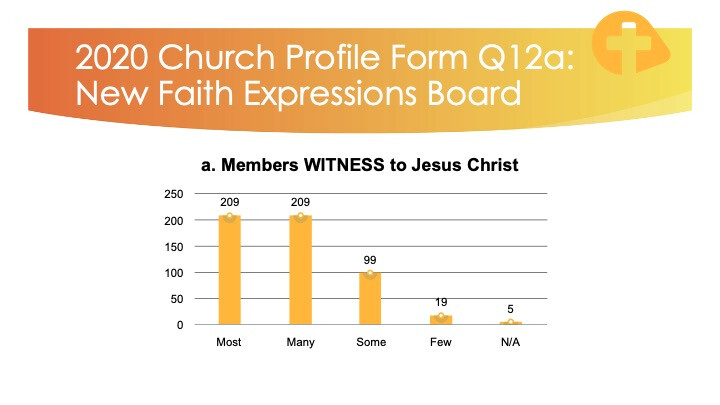
On this and each of the following slides you will see the question number from the 2020 Church Profile Form and the Discipleship Agency to which it relates.
418 churches reported that most or many of their members witness to Jesus Christ. 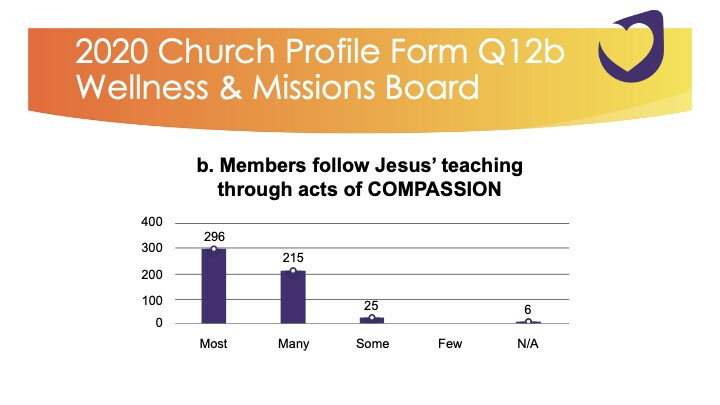
511 churches reported that most or many members follow Jesus’ teaching through acts of Compassion.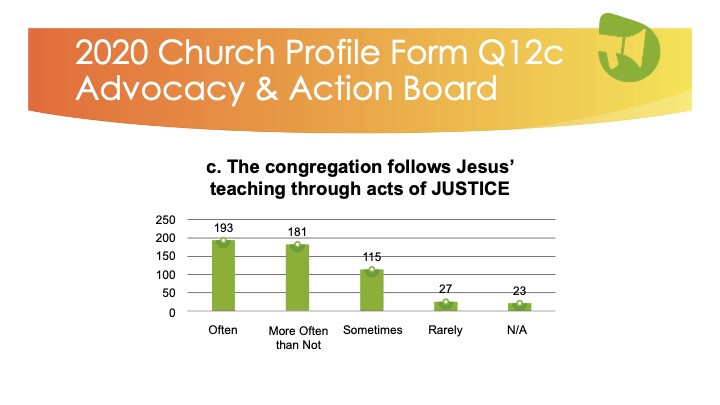
374 churches reported that the congregation follows Jesus’ teaching through acts of Justice often or more often than not.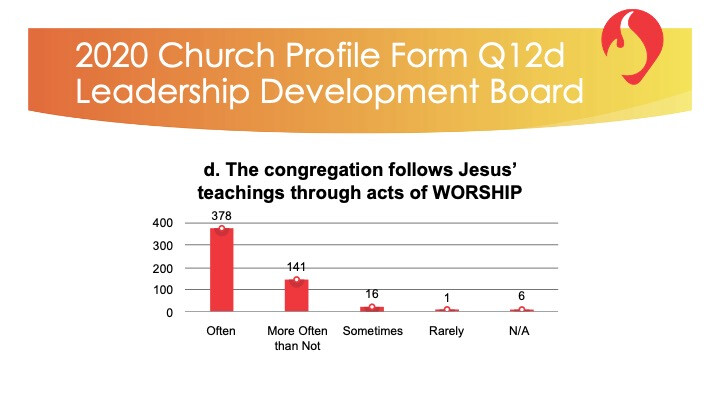
519 churches reported that the congregation follows Jesus’ teachings through acts of Worship often or more often than not.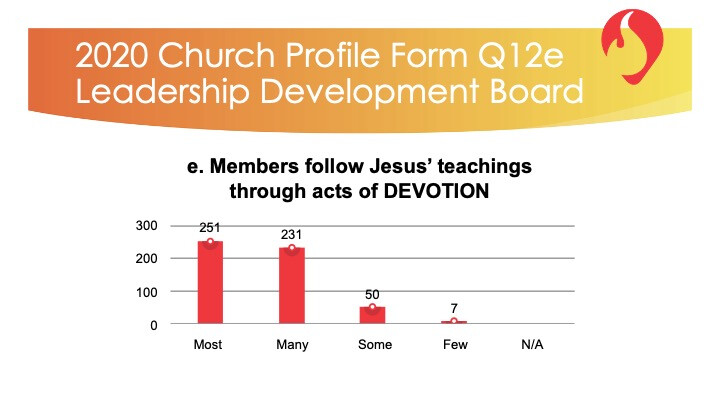
482 churches reported that most or many members follow Jesus’ teaching through acts of Devotion.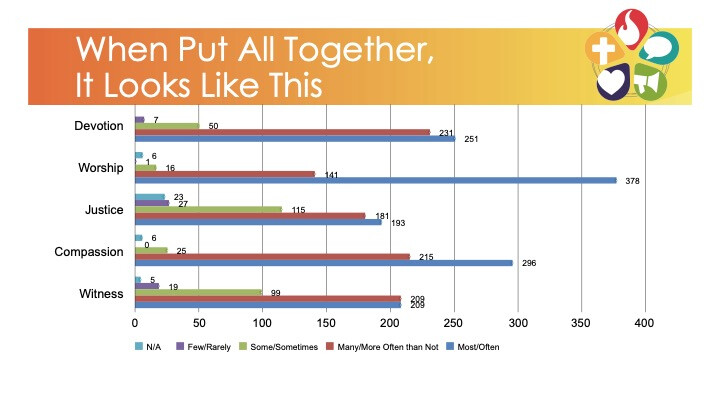
In this chart, the
- dark blue means most,
- red means many,
- green means some,
- purple means few, and
- bright blue means not applicable.
When the Discipleship Council looked at all five aspects, we couldn’t help but notice an unevenness and that justice wasn’t a spiritual discipline for most of our congregations.
Yet justice is a spiritual discipline. It is the way that we can love God and neighbor together. It is vital that we reclaim the spiritual discipline of justice as a part of our understanding of discipleship and congregational vitality.
Furthermore, it is important that we do this to live into our commitments to the NEJ Call to Action and our UM Constitution:
On the 2020 Church Profile form, we invited congregations to tell us where the congregation is on the path toward racial justice. People could -- and did -- select more than one response.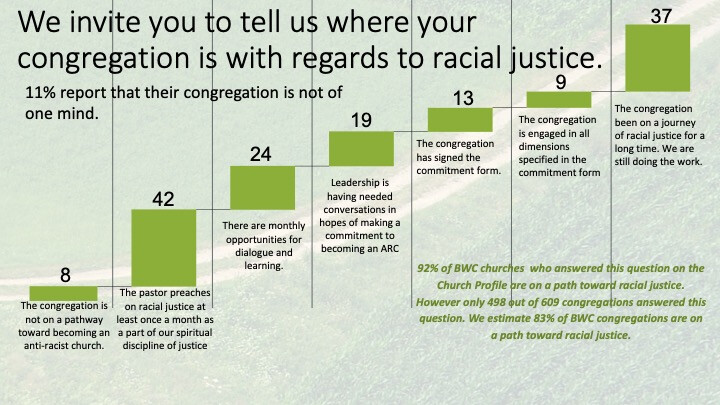
Of the 498 churches that answered this question,
- 8% reported that the congregation is not on a pathway toward becoming an antiracist church.
- 42% reported that the pastor preaches on racial justice at least once a month as a part of our spiritual discipline of justice for all God’s people.
- 24% reported that there are monthly opportunities for dialogue and learning.
- 19% reported Leadership is having needed conversations in hopes of being able to meaningfully sign the commitment form.
- 13% reported that the congregation has signed the commitment form.
- 9% reported that the congregation is engaged in all dimensions specified in the commitment form.
- 37% reported that our congregation has been on a journey of racial justice for a long time. We are still doing the work.
We celebrate that 83% of BWC congregations are on a path toward racial justice.
We also look forward to seeing how this baseline number grows when we receive results from the 2021 Discipleship Ministries form.
As you look at this slide, please note that congregations could choose more than one answer and 11% of our congregations are not of one mind.,
One of the Discipleship Council’s roles is to keep this on the dashboard, ensuring the Conference is providing adequate support for congregations to do this work and that the appropriate Conference groups are helping lead and resource, monitoring progress on the We Rise United project.
We have learned a lot from working with the individuals and churches who have committed to becoming an antiracist church.
The Racial Justice Team has formed three working groups in partnership with the Legislative Action Team, Black Methodists for Church Renewal, and Hispanic/Latino Ministries leadership as a result of our work with those who have signed the Commitment to Becoming an Antiracist Church. Those working groups meet regularly and include "How to Get Started and/or Get More Folks Involved in Becoming an Antiracist Church for Beloved Community,” "How to be a Catalyst for Change in a Congregation,” and "Working on Legislation and Policy for Change."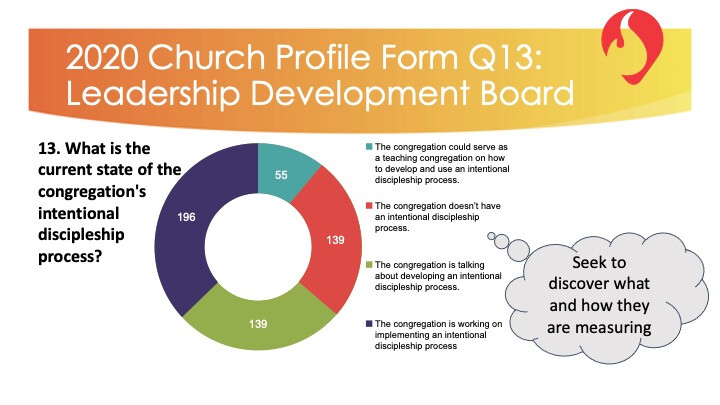
Deepening discipleship continues to be at the heart of all that we do. This chart illustrates the status of local congregations in the development of an intentional discipleship process. This information helps the Discipleship Council to know how to align Annual Conference resources to support local congregations to increase their capacity for making and maturing disciples.
We celebrate the number of persons reporting that congregations are:
- talking about implementing an intentional discipleship process (139)
- working on implementing an intentional discipleship process (196)
- identified as able to serve as a teaching congregation to develop and use an intentional discipleship process. (55)
We celebrate this information as it affirms for us that in the midst of uncertain and challenging times within the life of our denomination, congregations within our annual conference are remaining focused on one of the core tenets of our faith – Wesleyan discipleship.
We also recognize the need for supporting those congregations that have not yet implemented an intentional discipleship process. We hope to learn more about the factors that may prevent them from focusing on discipleship as these factors may also impact overall ministry vitality. 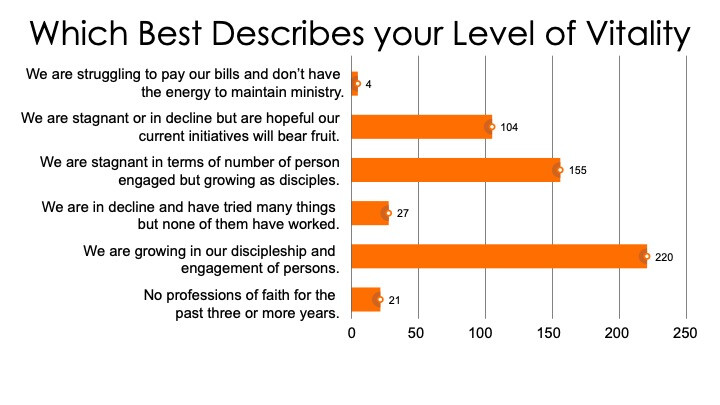
Effectively measuring ministry vitality remains of critical importance and we celebrate the number of persons reporting that congregations are:
- Growing in their discipleship and engagement of persons (220) and
- Growing as disciples although experiencing stagnation in the number of persons engaged (155).
In reviewing this information, Discipleship Council also could see that an intentional and ongoing focus on discipleship--especially in seeing all the people -- needs to be an essential part of resourcing congregations who aren’t experiencing fruit. 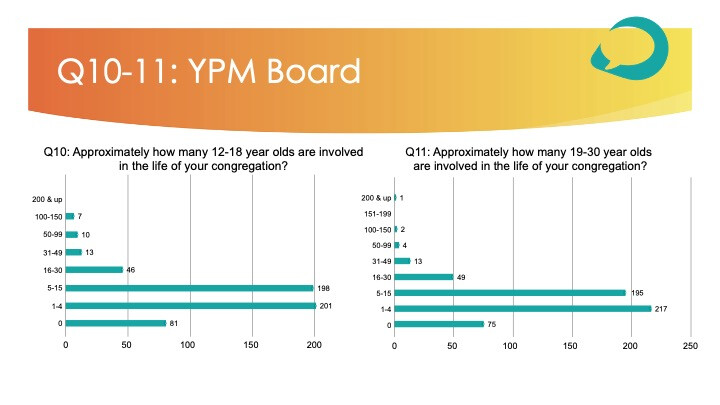
Finally, we have on our dashboard a Young People’s Ministries Strategic Goal of Growing Local Church Youth Engagement. We will track this by comparing this data year over year and seeing if the number of youth and young adults engaged in their churches increases year over year.
We don’t have comparisons between 2019 and 2020 because we just started collecting it in 2020.
This question and the previous ones are a part of the new Discipleship Ministries Form which is being used during this church conference season. We celebrate its focus and the fact that it is on the Church Conference Agenda.
All of the data gathered from the Pastor’s Reports and from the Discipleships Boards inform our approach to the 2021 Goals. By the end of 2021/beginning of 2022 we hope to have witnessed: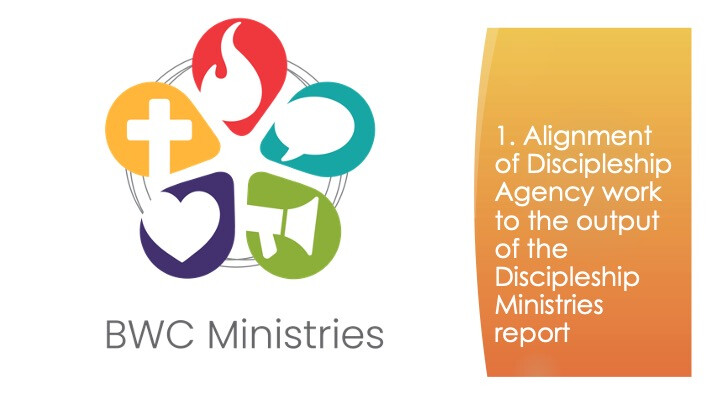
Continue to measure progress on board goals which are essential to the mission of inspiring and equipping local faith communities to make disciples of Jesus Christ for the transformation of the world. This year we will focus on the Alignment of Discipleship Board work to the output of the Discipleship Ministries report for greater Annual Conference impact.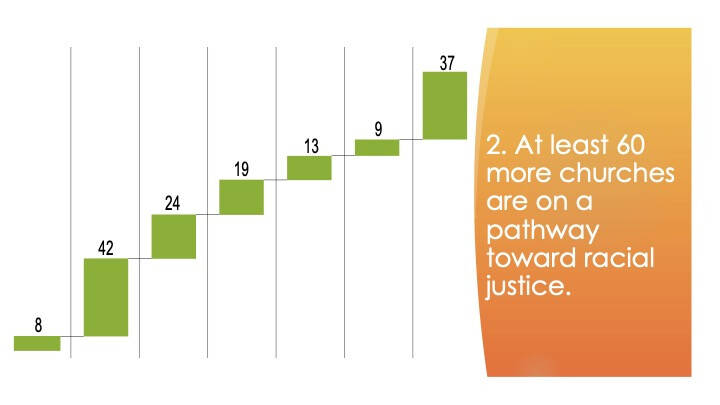
We see a 10% increase (at least 60 additional churches) in the number of churches that are on a pathway toward racial justice. Our work of antiracism is required for the creation of Beloved Community. It also requires practicing specific behaviors of intercultural competency, inclusion and equity. 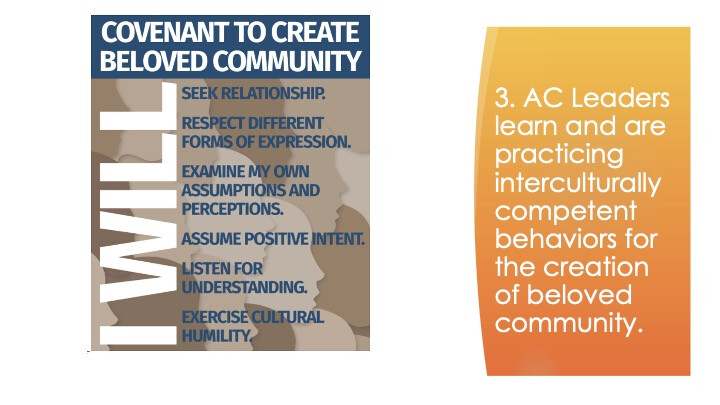
Our third goal is for Annual Conference Leaders (staff, district superintendents, district leaders, pastors, lay leaders and people serving on conference committees) to learn and practice interculturally competent behaviors for the creation of the Beloved Community.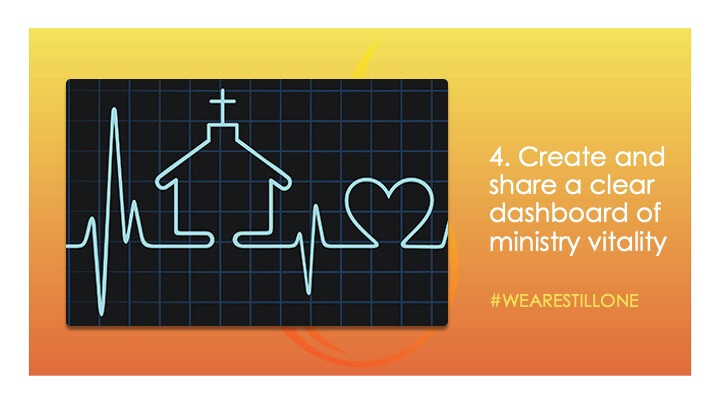
Creating a clear dashboard for Annual Conference Ministry with new strategic foci emerging from the work of the Discipleship Ministries boards and local churches.
As we continue to develop and refine this shared system of understanding, we will strengthen our ability to inspire and equip local faith communities to better develop disciples for the transformation of the world so that more transformed lives transform lives. And in so doing, witness to the fact that we are still one: standing, rising, transforming.
Rev. Jessica Hayden
Discipleship Council Chair
Board of Ordained Ministry
The Board of Ordained Ministry serves on behalf of all persons across the Baltimore-Washington Conference called to representative ministries of the Church as certified, licensed, commissioned and ordained persons. The Board is comprised of 60 lay and clergy persons who serve on behalf of more than 1200 persons under our care as either candidate for ministry, commissioned provisional members, deacons and elders in full connection, and retired members.
This conference year the Board of Ordained Ministry has continued to strengthen its work by engaging in several initiatives including working throughout the year to continue to clarify and affirm our values, continue to engage in Cultural Competency training for the entire Board, holding our second “Living Your Call” recruitment and enlistment event, and improving our examination processes for provisional and full member candidates. An important aspect of our work has involved transitioning the majority of our work, including our examination process for candidates for commissioning and ordination to a virtual environment. We have also continued to work to strengthen relationships with the seminaries with which we relate, and have worked with members of the Baltimore-Washington Conference Cabinet and staff to develop a framework and policy for Sexual Ethics and Boundaries, Women in Ministry, Cultural Competency, and Ministry in Cross-racial/Cross-cultural contexts. Additionally, the Board has developed several policies related to Continuing Education, the use of Ministerial Education Funds, and Clergy Care.
In 2021, the Board of Ordained Ministry continues to focus on enhancing its work in accordance with paragraph 635 of the 2016 Book of Discipline. We are continuing to evaluate our examination processes, in light of the ongoing potential that much of our work may need to be done virtually in the future. An important aspect of our current work continues to be serving as stewards of the process of supporting, evaluating, and examining persons who have offered themselves as candidates for ordained ministry as deacons and elders. We will also continue to engage in processes to enhance Cultural Competency for all persons on the Board, District Committees on Ministry, as well as candidates for ministry, and we look forward to moving the Women in Ministry Study process forward.
Rev. Dr. C. Anthony Hunt, Ph.D., Co-Chair, Board of Ordained Ministry
2020 General and Jurisdictional Conference Delegation
The Baltimore-Washington Conference Delegation, elected at the May 2019 Annual Conference, has continued to serve faithfully while awaiting the “postponed” 2020 General Conference and Northeastern Jurisdictional Conference. Over the past two years, the Delegation has experienced change as well as used this interim period for more intentional preparation.
First-time delegation members were especially impacted as they awaited their opportunity to fulfill their roles. Two of our laity delegates, Megan Blizzard and Chet Jechura, became licensed pastors and therefore could no longer serve as delegates. Consequently, the next people in election order moved up in ranking. Chris Schlieckert, the first elected NEJ delegate, became a General Conference delegate and Mittie Quinn and Charlie Moore, who were both alternates, became NEJ delegates.
The Delegation adjusted its processes to be in compliance with Judicial Council Decision 1403. Regarding the resolution on attendance passed at the 2019 BWC Annual Conference, the Judicial Council ruled that “Annual Conferences do not have the authority to adopt rules governing duly elected delegates to General Jurisdictional/Central Conferences that mandate attendance at Delegation meetings nor require such other behavior that is not already provided in the Discipline.”
As expected, the Delegation has spent much of its time becoming familiar with the legislation being considered at General Conference. Briefings by representatives of denominational boards and agencies were previously held in 2019 and early 2020. However, in light of the time elapsed, members of the delegation are currently scheduling refresher briefing sessions.
The postponement of the 2020 General Conference has meant that delegates and others interested in serving on denominational boards and agencies have not been able to be nominated and elected. However, the Northeastern Jurisdiction has led efforts to use this time to connect, especially with delegation heads. Further, among U.S. delegates, there have been grassroots-led efforts to consider a new vision for the United Methodist Church. Several delegation members, including the clergy and laity heads, have participated in these discussions.
Finally, during this interim period, our most significant work together has been on becoming an anti-racist church. In 2016, the NEJ Conference unanimously approved the “Call to Action for Racial Justice” which several Baltimore-Washington Conference members helped create/develop/write “in recognition of the deep and lasting problem of racial injustice in our denomination, jurisdictions and country, and vowed to constructively address it.” In 2020, the Delegation submitted to the Baltimore-Washington Annual Conference the “General-Jurisdictional Conference Delegation Anti-Racism Statement (2020),” declaring in part that “over the coming months, we as a delegation will work together to advance the cause of becoming a fully inclusive, anti-racist church” by examining our own “implicit biases” and “devising approaches to becoming anti-racist.” It is hoped that this work will influence how delegates view and vote upon legislation and its “impact in potentially disenfranchising people and communities of color, the poor, and those who have been marginalized and have been oppressed in other ways.” Delegation members Giovanni Arroyo, newly selected General Secretary of the Religion and Race, Christie Latona, and Stacey Cole-Wilson have taken the lead in this effort supported by other members. As an outcome of this deliberate work together, we are pleased to present to the Baltimore-Washington Annual Conference our vision statement, “A Church that Embodies Inclusion, Diversity, Equity, and Antiracism.” Additionally, delegate training and engagement in the journey of becoming anti-racist is planned to begin in November 2021, followed by further discernment and practice.
Respectfully Submitted,
Ianther Mills (Clergy) and Cynthia Taylor (Laity)
Baltimore-Washington Conference Delegation Heads
A statement from the BWC delegation:
A Church that Embodies Inclusion, Diversity, Equity, and Antiracism:
The Journey to Beloved Community
Executive Summary:
A church with Christ at the center does no harm, does good and attends to the ordinances of God. This church forms disciples of Jesus Christ who affirm the Image of God in the other, practice inclusive ministry, embody racial equality and challenge systems that oppose or oppress human rights. This Beloved Community ensures policies and practices are just, are faithful to the Gospel of Jesus Christ, and upholds the Great Commandment and the Gospel mandate that: “If one part hurts, every other part is involved in the hurt, and in the healing. If one part flourishes, every other part enters into the exuberance.” (1 Corinthians 12:26b MSG).
Acknowledging that privilege comes in many forms and that individuals have experienced aspects of privilege in different ways, a church that actively challenges racist attitudes, behaviors, practices, and histories both individually and systemically, is building Beloved Community.
As we work intentionally to dismantle racism and create equity, it is imperative that we are patient with those who deny, defend, minimize and accept the sin of racism and still love those who defer this work to another group, organization, or realm beyond the church. It is also imperative that we are not silent in the face of injustice, nor are we tolerant of oppressive behaviors.
This Baltimore-Washington Conference delegation is committed to this journey toward Beloved Community for the transformation of lives, churches and communities. We invite you to join us.
---
A church with Christ at the center actively seeks to do no harm, do good and attend to the ordinances of God. This church produces effective, antiracist church leaders: disciples of Jesus Christ who affirm the Image of God in the other, practice inclusive ministry, and embody racial equality.
- A disciple is one who witnesses to Jesus Christ through acts of justice, compassion, devotion and worship under the guidance of the Holy Spirit, practicing works of piety and mercy.
- Affirming the image of God means respecting that all humans are equal, inherently good, bearers of God’s light, and beloved creations of God, as seen at the creation in Genesis 1:27.
- Inclusive ministry means that leaders are intentional about including all in the reign of God.
- Equality means the state of being equal, especially in status, rights, and opportunities.
- Equity recognizes that each person has different circumstances and allocates the exact resources and opportunities to reach an equal outcome. “Equity acknowledges that everyone does not begin from the same starting place, that there are historic, systemic, and on-going inequities in our political, economic, educational, health, religious, and other systems, where discrimination “lives” within the structures themselves.”
We seek to be a community of sacrificial and unconditional love for all people that ensures policies and practices are just, faithful and in keeping with the greatest commandment of God: Love God, self and neighbor with wholeness of mind, body, heart and strength. In such a community -- where personal and social transformation happens -- hearts, habits, and institutions are changed. This community commits to the thriving of each person, based on 1 Corinthians 12:12-27. “If one part hurts, every other part is involved in the hurt, and in the healing. If one part flourishes, every other part enters into the exuberance.” (1 Cor. 12:26b MSG). This body:
- Privileges the inclusion of all people and groups within the church.
- Discusses and responds to societal and racial injustice, even when conversations get difficult, uncomfortable and/or painful.
- Demonstrates that all are sacred and diversity is valued.
- Builds equity and just power systems with all people, particularly those who are Black, Indigenous, People of Color (BIPOC).
Acknowledging that privilege comes in many forms and that individuals have experienced aspects of privilege in different ways, an antiracist church is one that actively challenges racist attitudes, practices, and histories both individually and systemically as it seeks to be and build Beloved Community. This includes:
- Owning why we are the way we are without denial, minimization or whitewashing.
- Interrupting our implicit biases.
- Naming white supremacy before dismantling it, emptying the church from privilege, repenting and reconciling in meaningful ways.
- Tearing apart the notion of assimilation.
- Ensuring that dominant culture or white normativity is not the prescribed way of functioning.
- Partnering with the whole community to honor where we all come from and those things that we all share.
- Embracing the complexity of intersectionality, as this is not a binary issue.
A process of awareness and dismantling racist ideas, actions and policies that exist in the church as well as broader community includes:
- Finding ways to engage those who are at different places in antiracism lifework.
- Being patient with those who deny, defend, minimize and accept the sin of racism and those who defer this work to another group, organization, or realm beyond the church.
- Engaging and paying attention to everyone: understanding that there are multiple ways of being, thinking and doing.
- Eliminating barriers that prevent the thriving and flourishing of particular groups.
- Naming racism and/or other factors as drivers of inequity.
- Providing historical context and analysis for how particular groups have fared in the past, namely BIPOC.
- Critiquing the way that white supremacy and other forms of oppression impact discussions and decision making.
- Advancing policy interventions within the church and society that seek to address or repair the present day manifestations of past harms.
- Advancing policy solutions that are both targeted and universal; a universal goal shared by all groups, with a targeted policy intervention for how particular groups achieve this universal goal.
As a church, we seek to build and nurture Beloved Community, believing that as we embody, create and seek inclusion, diversity, equity and antiracism, we align ourselves with the reign of God. In these efforts, we strive to live as disciples -- intent on manifesting the love of God in all that we do and all that we are.
